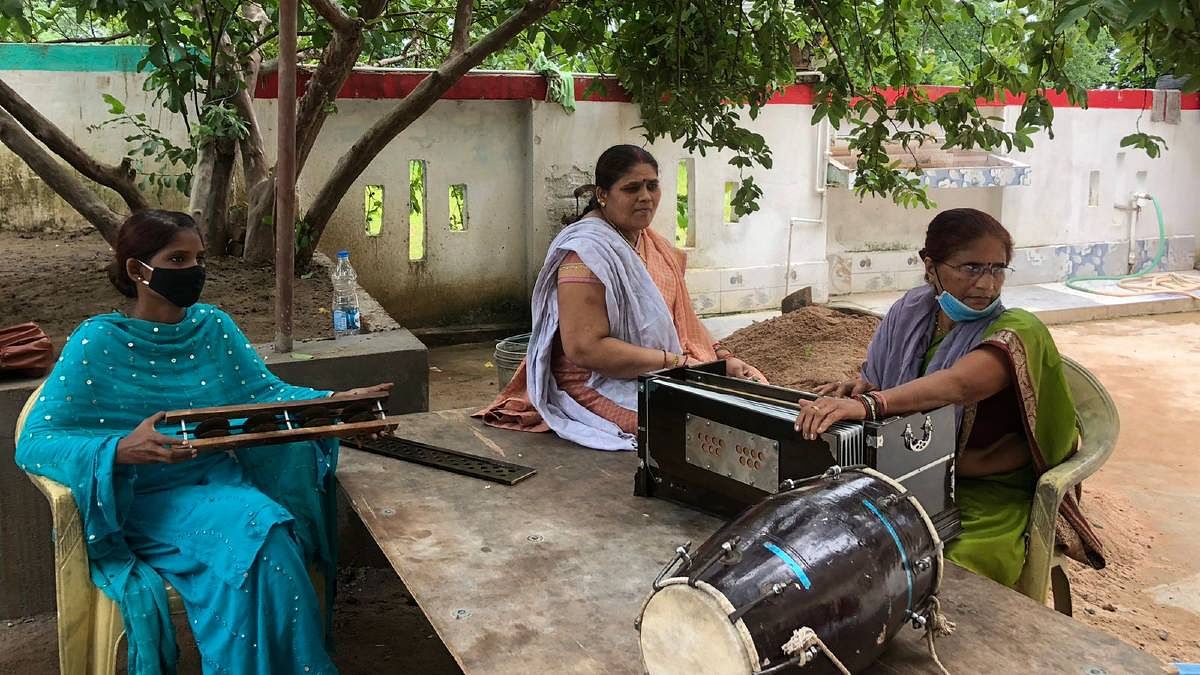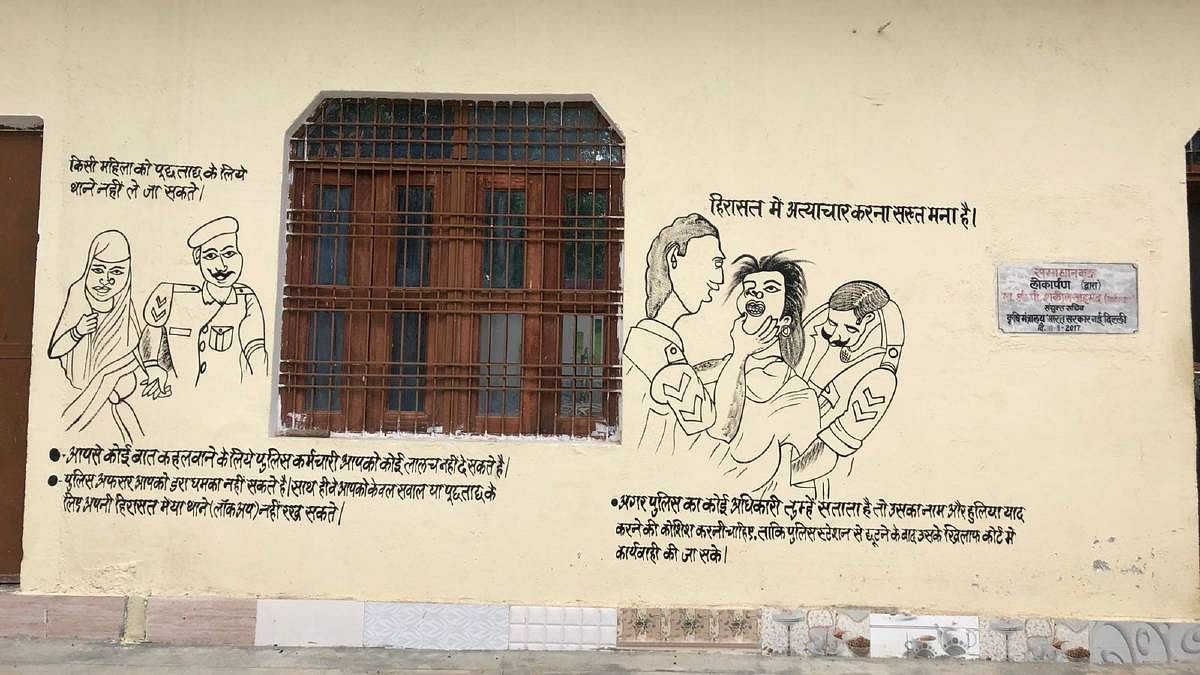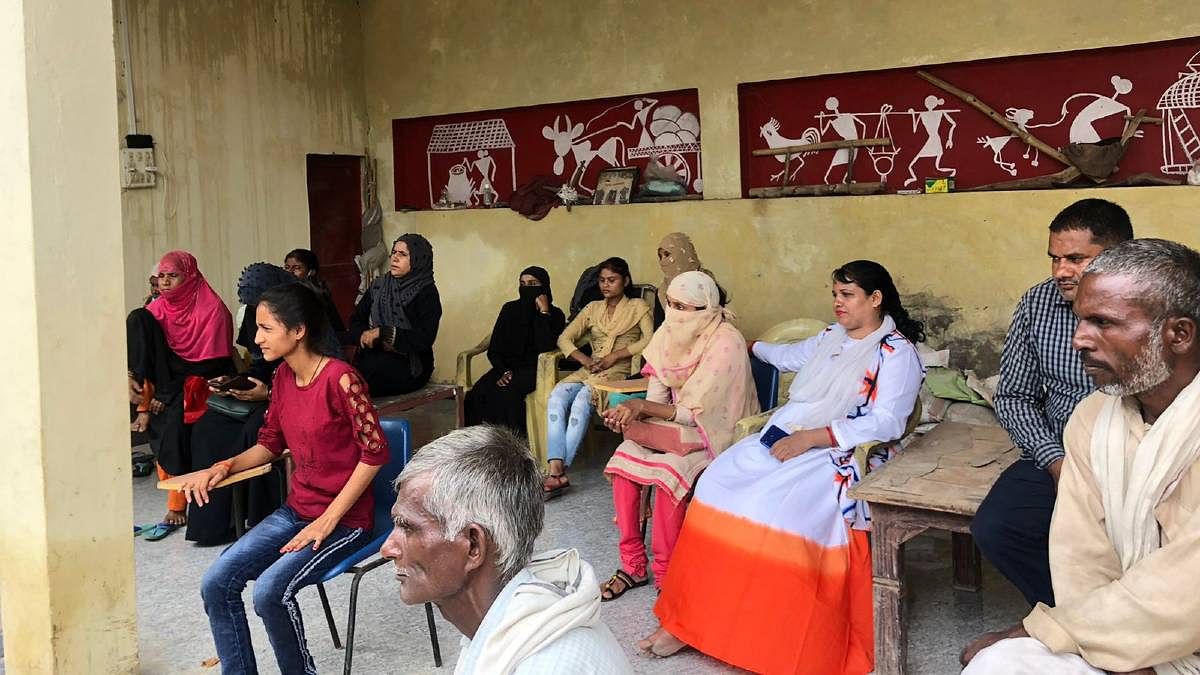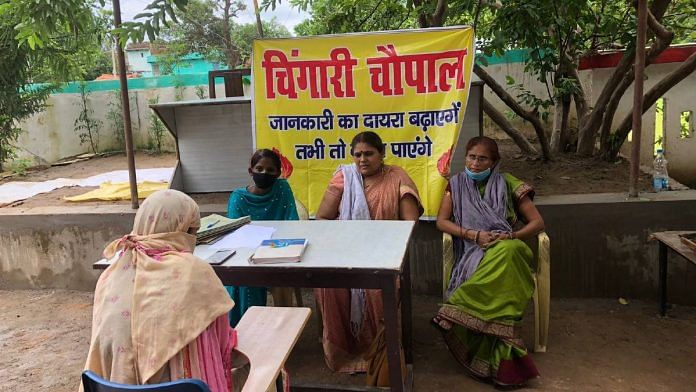Banda: ‘Chup Chup rahna, ghut ghut jeena, ye baat humein manzoor nahin (Don’t talk about your sufferings, bury your feelings, we don’t accept a life of suffocation like this).”
This is the motto of Chingari Adalat — a women’s self-help group operating in UP’s Banda district that has been empowering women to break the shackles of silence imposed by generations of patriarchal society and talk about issues like domestic violence and sexual abuse faced by them.
Started in 2019 by the Vidya Dhami Society — an NGO registered in 2001 by a local activist who goes by the name of Raja Bhaiyya — Chingari Adalat works as an informal ‘women’s courtroom’, dispensing legal advice, ensuring victims have access to legal recourse and, if needed, providing them with financial help in their legal battle.
At the centre of operations are three women — 35-year-old Mubina, 54-year-old Meenakshi Gupta and 50-year-old Pushplata. While Meenakshi and Pushplata have been social activists working for marginalised women in the Bundelkhand region for the past three decades, Mubina, is the one who connects with the victims, speaking their language and explaining to them the legal parlance often used by Meenakshi and Pushpalata that many of them don’t understand.
Meetings are held every Sunday, where lawyers are also present to advise the women. The Chingari Adalat workers first hear out the women and counsel them. If legal recourse has already been sought, the documents are studied and further action advised. Others are told how to approach the police and legal set-up. The Adalat’s workers follow up with the police and lawyers on the cases as and when needed.
“Due to poverty, many women are not able to hire good lawyers. We provide financial help also. This way, we ensure that women have a sense of security and solidarity. When they move ahead with their legal battles to get justice, Chingari Adalat tries to become the force behind them,” Raja Bhaiya said.
According to the data shared by Chingari Adalat, it received 346 complaints of domestic violence in 2019. The number rose to 477 in 2020 and, in 2021 they have already received 311 complaints till the end of July.
However, according to Raja Bhaiyya, the number of complaints received in the past year-and-a-half should not be considered to be representative of the extent of the problem, since “fewer women could access the justice system meant for them during Covid times”.
“The true picture of domestic violence during this period might not be reflected in the total number of registered FIRs registered pan-India,” he added.
His views are shared by police officers across districts in UP, many of whom told ThePrint on condition of anonymity that not every victim of domestic abuse reaches out to the police. This has been even more so during the pandemic.
“Due to public transport being unavailable for many months during the lockdown, vulnerable women could not leave their homes and fewer cases of abuse reached the authorities,” said a police superintendent in UP. “Also, the police were overburdened with Covid management during this time.”
Also read: How this remote, backward UP district is fighting malnutrition amid Covid pandemic
‘He married another woman’
Meenakshi, Pushplata and Mubina were seated under a guava tree in the premises of the Vidya Dhami Society in Banda’s Attara town, when ThePrint caught up with them on a Sunday. In front of them sat 34-year-old Naseem Bano, shaking with fear, anxiety and nervousness. Years of alleged domestic abuse, coupled with the financial difficulties she was facing, had made Bano a nervous wreck.
Married in 2006 to a tailor, the abuse started within a few years of the wedding, she claimed. Finally, in 2013, Bano filed a case of domestic abuse and dowry harassment against her husband. According to her, he had also started demanding more dowry as an excuse for harassment.
While her case is still pending in the Banda district court, she claimed the court directed her husband in 2016 to provide her interim financial support. But Bano, who has an 11-year-old daughter to support, alleges that she has not received any money from him since.

The breaking point for her came in July, when a close relative sent her photos of her husband with his new wife. Bano claimed he remarried under an Islamic custom that allows him to do so without divorcing her first. She has, however, not filed any police complaint against him for the remarriage.
‘He married another woman while I am running from pillar to post to find a job to feed my daughter,” she said.
Once a teacher at a private school in Attara, with a monthly salary of Rs 3,300, Bano lost her job last year when the school closed due to the Covid pandemic.
Now, she has no support even from her own family. While she has enrolled herself at a tailoring course, she has no income as yet.
“My parents are no more. My two brothers don’t help me at all. I am managing to survive on the ration and free gas cylinder provided by the government. One of my three sisters has offered to take care of my daughter till I manage to get an income,” she said.
As Bano broke down, Mubina brought her a glass of water, Meenakshi gave her a bracing hug, and a group of workers associated with the NGO picked up the anthem of ‘Chup Chup rahna, ghut ghut jeena, ye baat humein manzoor nahin‘, to the beats of a tabla.
Finally composed, Bano, gets up to go to the nearby hand pump to wash her swollen, tear-streaked face. Her place is taken by 16-year-old Fiza, a victim of alleged sexual abuse.
Also read: How ‘pad bank’ set up by Allahabad University students is helping slum residents junk rags
‘Uncomfortable with questions at the police station’
A resident of Banda Town, Fiza was alone at home — her mother had gone to collect ration — when a neighbour forcefully entered the house and attempted to sexually abuse her in June, she alleged. Over the next two months, she claimed, he attempted it twice more. Both times her mother, a daily wage labourer was not at home. Her two brothers work in Ghaziabad, and Fiza and her mother are the only ones in the family living in Banda.
The mother-daughter duo did not have the courage to go to the police station and file an FIR. Instead, Fiza’s mother who knew of Mubina’s involvement with Chingari Adalat, decided to contact her.
According to Mubina after she had explained to them the severity of the crime and the legal recourse available to them, they decided to approach the police.

‘But at the police thana, I was very uncomfortable with the way questions were asked about the harassment. At Chingari Adalat it is different. I can see dozens of women with similar experiences and I can share my ordeal without being judged,” Fiza told ThePrint.
Fiza’s experience of discomfort with the legal proceedings is not isolated, claimed Mubina. The activist, who said she has been accompanying victims to police stations and courts for a while now, claimed that the language used at these places is intimidating and “patriarchal”. Many survivors she has accompanied, didn’t share their true experience as a result, she said, because they “feared being misunderstood, shamed or judged”.
The gathering at Attara is representative of the way the organisation works.
Weekly meetings are held every Sunday at the premises of the Vidya Dhami Society. According to Raja Bhaiyya, about 15-20 women come on an average at every gathering, and like Fiza and Bano, are counselled and provided legal help. Banda lawyers Manjar Ali, Rajender Singh, and Dwarkesh Singh take turns to be present at the meetings to help the survivors with legal advice.
Also read: With no routine check-ups or ASHA workers, UP’s Chitrakoot sees rise in home births during Covid
From education to empowerment
When Raja Bhaiyya had started the Vidya Dhami Society in 2001, it was with the aim of providing education to girls, he said. Over the years, however, the NGO moved into highlighting human rights, agriculture and health-related issues in the region. A turning point came in 2019, when the NGO team saw women had stopped coming to the weekly baitakhi — a gathering organised to educate people about government welfare schemes and to create social awareness.
When they enquired about it, they found it was because of the patriarchal mindset which imposed “purdah” on the women. Slowly, they also started hearing of cases of abuse which the women found difficult to express.
Thus was born the Chingari Adalat, a platform that would give voice to the sufferings often faced by rural women in silence, said Raja Bhaiyya.
‘We traced individual cases only to find that survivors of domestic abuse were not participating at the baithaki. They were also not reaching the authorities due to the hostile environment in police stations and courts. At Chingari Adalat, the survivors are heard, counselled and helped in fighting their legal battles,” said Raja Bhaiyya.

The Covid pandemic in 2020 and the resulting nationwide lockdown impacted the working of the organisation. Meetings of the Adalat were suspended for many months. After the second Covid wave, as the weekly gatherings resumed, Raja Bhaiyya said more and more women started turning up, eager to find an outlet for their sufferings.
The biggest challenge for the organisation, according to Mubina, is to make survivors aware of their own power and strength, to make them understand that they are not the “weaker sex”.
“It takes several rounds of meetings and earning their trust, to bring them out of their trauma. We don’t tell them what women are commonly told here ‘samjhauta kar lo‘ or adjust. Rather we do the hand-holding in the beginning and they turn out to be well prepared for their battles,” Mubina added.
The confidence and determination to fight were clear in Bano, as she left the gathering.
“Mujhe niranay chahiye, muaavja chahiye aur ab peedit hokar nahin rahna (I want closure, compensation and don’t want to live like a victim),” she told ThePrint.
(Edited by Poulomi Banerjee)



